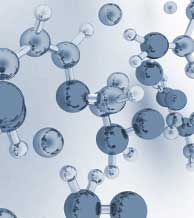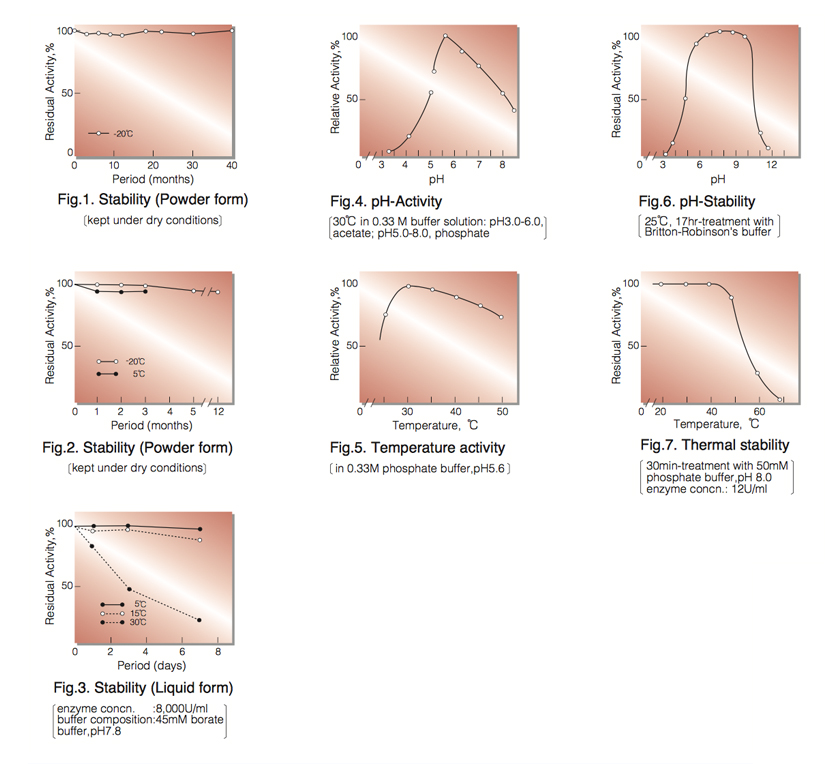ASCORBATE OXIDASE from Cucumis sp.
ASO-301
L-Ascorbate: oxygen oxidoreductase (EC 1.10.3.3)
L-Ascorbic acid + ½O₂→ Dehydroascorbic acid + H₂O
| Appearance: | Light blue amorphous powder, lyophilized | |
|---|---|---|
| Activity: | GradeⅢ 200U/mg-solid or more (containing approx. 70% of stabilizers) |
|
| Contaminants: | Catalase ≤1.0×10⁻¹ % Phosphatase ≤2.0×10⁻² % |
|
| Stabilizers: | BSA, borax, basic amino acids. | |
| Stability: | Stable at -20°C for at least One year (Fig.1) |
|---|---|
| Molecular weight: | 132,000 ¹⁾, 140,000 ²⁾ |
| Isoelectric point: | between 6.0 and 7.8 ¹⁾, 8.2 ²⁾ |
| Michaelis constant: | 2.5×10⁻⁴M (Ascorbate) |
| Structure: | 8 copper atoms per mol of enzyme ¹, ²⁾ |
| Inhibitors: | cyanide, Na₂S, diethyldithiocarbamate (Na) |
| Optimum pH: | 5.6(Fig.4) |
| Optimum temperature: | approx. 30℃(Fig.5) |
| pH Stability: | pH 7.0−10.0 (25℃, 17hr) (Fig.6) |
| Thermal stability: | below 40℃ (pH 8.0, 30min) (Fig.7) |
| Substrate specificity: | This enzyme oxidizes ascorbic acid and several ascorbic derivatives.³⁾ |
| Effect of various chemicals: | (Table 1) |
APPLICATIONS
This enzyme is useful for enzymatic determination of ascorbic acid and for eliminating the interference of ascorbic acid in clinical analysis.
ASSAY
Principle:
ascorbate oxidase
Ascorbic acid+½O₂ ►Dehydroascorbic acid+H₂O
The disappearance of ascorbic acid is measured at 245nm by spectrophotometry.
Unit definition:
One unit causes the decrease of one micromole of ascorbic acid per minute under the conditions described below.
Method:
| A.Ascorbic acid solution: | 1.0mM [Dilute the stock solution (10mM) to 10-fold volume with 0.2 M KH₂PO₄ solution containing 1.0mM EDTA.](Prepare freshly) Stock solution : 176mg L-ascorbic acid (MW=176.13)/100ml of 1.0mM HCl solution containing 1.0mM EDTA (Stable for one month if stored at 0-5°C) |
|---|---|
| B. Na₂HPO₄ solution: | 10mM |
| C. HCl solution: | 0.2N |
| D. Enzyme diluent: | 10mM Na₂HPO₄ solution containing 0.05% BSA (Should be freshly prepared) |
Procedure
| Concentration in assay mixture | |
|---|---|
| KH₂PO₄ | 82 mM |
| Na₂HPO₄ | 5.5 mM |
| Ascorbic acid | 0.45 mM |
| EDTA | 0.45 mM |
| BSA | 45.4µ g/ml |
1. Prepare the following reaction mixture in a test tube and
equilibrate at 30℃ for about 5 minutes.
0.5ml Substrate solution (A)
0.5ml Na₂HPO₄ solution (B)
(pH of the reaction mixture should be 5.6.)
2. Add 0.1ml of the enzyme solution* and mix.
3. After exactly 5 minutes at 30°C, add 3.0ml of HCl solution (C) to stop the reaction and measure the optical
density at 245nm against water (OD test).
At the same time, prepare the blank by first mixing the reaction mixture with 3.0ml of HCl solution (C) after
5 min-incubation at 30°C, followed by adding the enzyme solution (OD blank).
* Dissolve the enzyme preparation in ice-cold distilled water (more than 60U/ml) and dilute to 0.15-0.25U/ml with ice-cold enzyme diluent (D), immediately before assay.
Calculation
Activity can be calculated by using the following formula :

ΔOD (OD blank−OD test) × Vt × df
Volume activity (U/ml) = =ΔOD × 0.820 × df
10.0 × 1.0 × t × Vs
Weight activity (U/mg) = (U/ml) × 1/C
- Vt
- : Total volume (4.1ml)
- Vs
- : Sample volume (0.1ml)
- 10.0
- : Millimolar extinction coefficient of ascorbic acid under the assay condition at pH 1.0 (㎠/micromole)
- 1.0
- : Light path length (cm)
- t
- : Reaction time (5 minutes)
- df
- : Dilution factor
- C
- : Enzyme concentration in dissolution (c mg/ml)
REFERENCES
- T.Nakamura, N.Makino and Y.Ogura; J.Biochem., 64, 189 (1968).
- V.Ts.Aikazyan and R.M.Nalbandyan; FEBS LETTERS, 104, 127 (1979).
- G.A.White and F.G.Smith; Nature, 190, 187 (1961).
| Chemical | Concn.(mM) | Residual activity(%) |
Chemical | Concn.(mM) | Residual activity(%) |
|---|---|---|---|---|---|
| None | − | 100 | MIA | 2.0 | 3.5% |
| Metal salt | 2.0 | NEM | 2.0 | 75 | |
| MgCl₂ | 88 | IAA | 2.0 | 21 | |
| CaCl₂ | 86 | Hydroxylamine | 2.0 | 81 | |
| Ba(OAc)₂ | 86 | EDTA | 5.0 | 80 | |
| FeCl₃ | 34 | o-Phenanthroline | 2.0 | 50 | |
| CoCl₂ | 83 | α,α'-Dipyridyl | 1.0 | 78 | |
| MnCl₂ | 88 | Borate | 50 | 75 | |
| ZnCl₂ | 90 | NaF | 2.0 | 84 | |
| CdCl₂ | 87 | NaN₃ | 2.0 | 85 | |
| NiCl₂ | 79 | Triton X-100 | 0.10% | 84 | |
| CuSO₄ | 90 | Brij 35 | 0.10% | 24 | |
| Pb(OAc)₂ | 91 | Tween 20 | 0.10% | 19 | |
| AgNO₃ | 3.7 | Span 20 | 0.10% | 97 | |
| HgCl₂ | 42 | Na-cholate | 0.10% | 80 | |
| 2-Mercaptoethanol | 2.0 | 75 | SDS | 0.05% | 83 |
| PCMB | 1.0 | 26 | DAC | 0.05% | 88 |
Ac, CH₃CO; PCMB, p-Chloromercuribenzoate; MIA, Monoiodoacetate; NEM, N-Ethylmaleimide; IAA, lodoacetamide;
EDTA, Ethylenediaminetetraacetate; SDS, Sodium dodecyl sulfate; DAC, Dimethylbenzylalkylammonium chloride.

To get a quote, contact us at info@toyobousa.com, or INQUIRY.